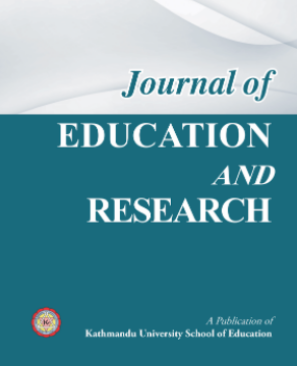
Contribution of Financial Literacy on Behaviour: A Nepali Perspective
Original Article
Journal of Education and Research, Volume 8, Issue 2, 2018, 75-92, https://doi.org/10.3126/jer.v8i2.27380
Publication date: Dec 31, 2018
Views: 592 | Downloads: 1255
How to cite this article
APA
In-text citation: (Chaulagain, 2018)
Reference: Chaulagain, R. P. (2018). Contribution of Financial Literacy on Behaviour: A Nepali Perspective. Journal of Education and Research, 8(2), 75-92. https://doi.org/10.3126/jer.v8i2.27380
Reference: Chaulagain, R. P. (2018). Contribution of Financial Literacy on Behaviour: A Nepali Perspective. Journal of Education and Research, 8(2), 75-92. https://doi.org/10.3126/jer.v8i2.27380
Vancouver
In-text citation: (1), (2), (3), etc.
Reference: Chaulagain RP. Contribution of Financial Literacy on Behaviour: A Nepali Perspective. Journal of Education and Research. 2018;8(2):75-92. https://doi.org/10.3126/jer.v8i2.27380
Reference: Chaulagain RP. Contribution of Financial Literacy on Behaviour: A Nepali Perspective. Journal of Education and Research. 2018;8(2):75-92. https://doi.org/10.3126/jer.v8i2.27380
AMA
In-text citation: (1), (2), (3), etc.
Reference: Chaulagain RP. Contribution of Financial Literacy on Behaviour: A Nepali Perspective. Journal of Education and Research. 2018;8(2), 75-92. https://doi.org/10.3126/jer.v8i2.27380
Reference: Chaulagain RP. Contribution of Financial Literacy on Behaviour: A Nepali Perspective. Journal of Education and Research. 2018;8(2), 75-92. https://doi.org/10.3126/jer.v8i2.27380
Chicago
In-text citation: (Chaulagain, 2018)
Reference: Chaulagain, Ramesh Prasad. "Contribution of Financial Literacy on Behaviour: A Nepali Perspective". Journal of Education and Research 2018 8 no. 2 (2018): 75-92. https://doi.org/10.3126/jer.v8i2.27380
Reference: Chaulagain, Ramesh Prasad. "Contribution of Financial Literacy on Behaviour: A Nepali Perspective". Journal of Education and Research 2018 8 no. 2 (2018): 75-92. https://doi.org/10.3126/jer.v8i2.27380
Harvard
In-text citation: (Chaulagain, 2018)
Reference: Chaulagain, R. P. (2018). Contribution of Financial Literacy on Behaviour: A Nepali Perspective. Journal of Education and Research, 8(2), pp. 75-92. https://doi.org/10.3126/jer.v8i2.27380
Reference: Chaulagain, R. P. (2018). Contribution of Financial Literacy on Behaviour: A Nepali Perspective. Journal of Education and Research, 8(2), pp. 75-92. https://doi.org/10.3126/jer.v8i2.27380
MLA
In-text citation: (Chaulagain, 2018)
Reference: Chaulagain, Ramesh Prasad "Contribution of Financial Literacy on Behaviour: A Nepali Perspective". Journal of Education and Research, vol. 8, no. 2, 2018, pp. 75-92. https://doi.org/10.3126/jer.v8i2.27380
Reference: Chaulagain, Ramesh Prasad "Contribution of Financial Literacy on Behaviour: A Nepali Perspective". Journal of Education and Research, vol. 8, no. 2, 2018, pp. 75-92. https://doi.org/10.3126/jer.v8i2.27380
ABSTRACT
Financial literacy and behaviour are emerging personal financial agendas both in education and finance. However, financial literacy has behavioural implication and effect on the financial well-being of individuals. Therefore, assessing financial behaviour by measuring financial literacy of individuals is important research attention. In this paper, the contribution of financial literacy on the financial behaviour of small borrowers is measured and analysed. The study follows a quantitative research methodology under the post-positivistic research paradigm. A simple scoring method is used to measure financial literacy and the logistic regression model is used to measure the probabilistic contribution of financial literacy on behaviour. By using a sample survey, the study collects 393 sets of responses from small borrowers selected randomly from four districts of Nepal. Theory of planned behaviour is used to interpret the finding. The theory of planned behaviour states that the literacy i.e. knowledge and skill in financial matters will develop an attitude, and if the attitude is positive, the persons will behave accordingly. The finding explores that improved level of financial literacy contributes financial behaviour of the small borrowers positively. The study concludes that for enhancing financial behaviour, contemporary and contextual financial literacy programs are necessary to educate the individuals. The study also connects financial well-beings with enhanced financial behaviour. Findings of this study are useful for policymakers, financial service users, academicians and financial service providers in Nepal.
REFERENCES
---
LICENSE
This work is licensed under a Creative Commons Attribution 4.0 International License.
